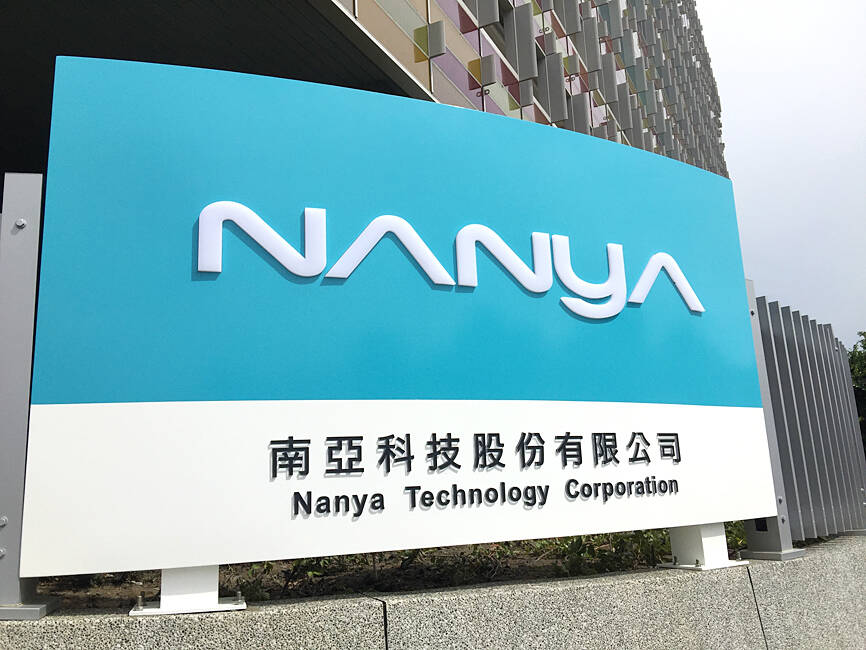DRAM chipmaker Nanya Technology Corp (南亞科技) yesterday reported its smallest losses in three quarters as recovering demand helped drive higher average selling prices and factory utilization.
Losses improved significantly to NT$1.21 billion (US$37.79 million) during the quarter ending on March 31, compared with losses of NT$2.48 billion in the previous quarter and losses of NT$1.69 billion a year earlier, the company said in a statement.
Gross margin improved to minus-2.9 percent, the best in five quarters, thanks to a high-single-digit percentage increase in average selling prices and lower idle equipment costs, Nanya Technology president Lee Pei-ing (李培瑛) told a virtual media briefing.

Photo: Grace Hung, Taipei Times
As its average selling price is expected to increase by a double-digit percentage this quarter, Lee said it is highly possible that gross margin would swing back into positive territory this quarter, an indicator that Nanya Technology is continuing to progress toward a turnaround.
“There is a chance that the average selling price will improve quarter by quarter,” he said. “We are more optimistic about DRAM price improvements” due to the effects of a massive earthquake that struck off the east coast on Wednesday last week.
Samsung Electronics Co, SK Hynix Inc and Micron Technologies Inc have resumed price negotiations with customers following a brief suspension awaiting damage assessments after the quake, which measured 7.2 on the Richter scale and magnitude 7.4 on the moment magnitude scale.
The top three companies have become more aggressive about pricing during the latest round of negotiations with customers, which could boost DRAM prices, Lee said.
Nanya Technology said the global DRAM industry would stage a gradual recovery this year, adding that the supply of DRAM chips could tighten after a bulk of the world’s DRAM capacity is used to produce high-density or high-bandwidth memory chips for artificial intelligence (AI) servers rather than standard servers.
On the demand side, the arrival of AI PCs later this year would increase the consumption of DRAM chips, coupled with increases in sales of premium smartphones in China, the company said.
However, it remains to be seen when the company will reverse six straight quarters of operating losses, given damage from the earthquake and volatile foreign exchange rates, it said.
The company’s production has been fully restored after a brief suspension due to the quake, it said.
In the first quarter, operating losses improved to NT$2.92 billion, compared with losses of NT$4.05 billion in the previous quarter and losses of NT$2.89 billion a year earlier, the company said.
Nanya Technology yesterday raised its capital spending this year 30 percent to NT$26 billion from an earlier estimate of NT$20 billion.
Shipments are expected to increase more than 20 percent annually this year, it said.

Taiwan Semiconductor Manufacturing Co (TSMC, 台積電) last week recorded an increase in the number of shareholders to the highest in almost eight months, despite its share price falling 3.38 percent from the previous week, Taiwan Stock Exchange data released on Saturday showed. As of Friday, TSMC had 1.88 million shareholders, the most since the week of April 25 and an increase of 31,870 from the previous week, the data showed. The number of shareholders jumped despite a drop of NT$50 (US$1.59), or 3.38 percent, in TSMC’s share price from a week earlier to NT$1,430, as investors took profits from their earlier gains

In a high-security Shenzhen laboratory, Chinese scientists have built what Washington has spent years trying to prevent: a prototype of a machine capable of producing the cutting-edge semiconductor chips that power artificial intelligence (AI), smartphones and weapons central to Western military dominance, Reuters has learned. Completed early this year and undergoing testing, the prototype fills nearly an entire factory floor. It was built by a team of former engineers from Dutch semiconductor giant ASML who reverse-engineered the company’s extreme ultraviolet lithography (EUV) machines, according to two people with knowledge of the project. EUV machines sit at the heart of a technological Cold

AI TALENT: No financial details were released about the deal, in which top Groq executives, including its CEO, would join Nvidia to help advance the technology Nvidia Corp has agreed to a licensing deal with artificial intelligence (AI) start-up Groq, furthering its investments in companies connected to the AI boom and gaining the right to add a new type of technology to its products. The world’s largest publicly traded company has paid for the right to use Groq’s technology and is to integrate its chip design into future products. Some of the start-up’s executives are leaving to join Nvidia to help with that effort, the companies said. Groq would continue as an independent company with a new chief executive, it said on Wednesday in a post on its Web

CHINA RIVAL: The chips are positioned to compete with Nvidia’s Hopper and Blackwell products and would enable clusters connecting more than 100,000 chips Moore Threads Technology Co (摩爾線程) introduced a new generation of chips aimed at reducing artificial intelligence (AI) developers’ dependence on Nvidia Corp’s hardware, just weeks after pulling off one of the most successful Chinese initial public offerings (IPOs) in years. “These products will significantly enhance world-class computing speed and capabilities that all developers aspire to,” Moore Threads CEO Zhang Jianzhong (張建中), a former Nvidia executive, said on Saturday at a company event in Beijing. “We hope they can meet the needs of more developers in China so that you no longer need to wait for advanced foreign products.” Chinese chipmakers are in